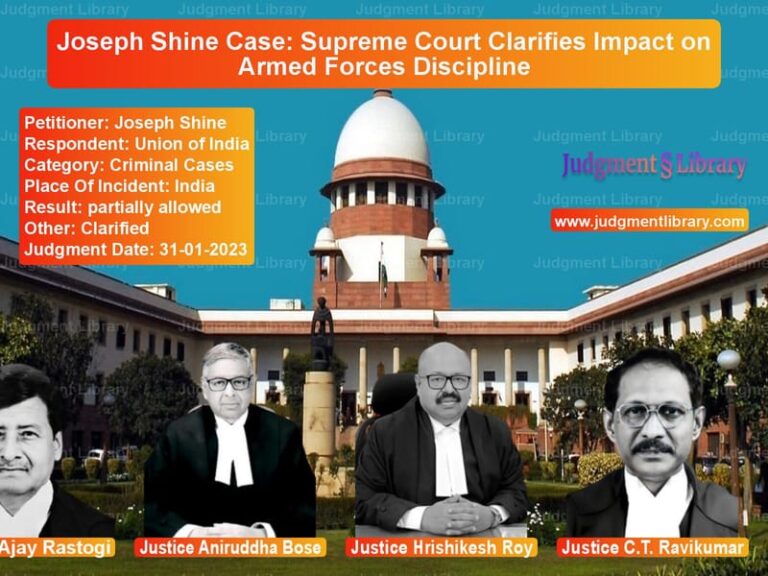Bribery Charges Overturned: Supreme Court Acquits Tax Officer in Corruption Case
The case of K. Shanthamma vs. The State of Telangana is a landmark ruling in the field of corruption law. The Supreme Court overturned the conviction of a Commercial Tax Officer accused of demanding and accepting a bribe under the Prevention of Corruption Act, 1988. The judgment reaffirmed the legal principle that demand and acceptance of illegal gratification must be proved beyond doubt to secure a conviction under the Act.
Background of the Case
The appellant, K. Shanthamma, was serving as a Commercial Tax Officer in Secunderabad. The prosecution’s case was that she had demanded and accepted a bribe of Rs. 2,000 from the complainant, R. Seetharamulu (PW1), who worked as a supervisor at a cooperative society responsible for filing commercial tax returns.
The complainant alleged that despite the tax assessment for the year 1997-98 being completed, the appellant delayed the issuance of the final assessment order for the year 1996-97. According to the prosecution, she made an initial demand of Rs. 3,000 for clearing the assessment, which was later reduced to Rs. 2,000. The complainant then approached the Anti-Corruption Bureau (ACB), leading to a trap being set up to catch the appellant in the act of accepting the bribe.
Prosecution’s Allegations
The prosecution’s case was based on the following key claims:
- The appellant initially demanded a bribe of Rs. 3,000, which she later reduced to Rs. 2,000.
- PW1, the complainant, approached the ACB, which laid a trap.
- On March 27, 2000, the complainant met the appellant in her office and allegedly handed over the tainted notes.
- The appellant allegedly took out a diary from her drawer, opened it, and asked the complainant to place the bribe inside. She then closed the diary and kept it in the drawer.
- The ACB officials entered and found the tainted notes inside the diary in her drawer.
- The trial court convicted the appellant under Sections 7 and 13(1)(d) read with Section 13(2) of the Prevention of Corruption Act.
Defense’s Arguments
The appellant denied the allegations and argued:
- The complainant had fabricated the case against her.
- The prosecution failed to prove that she had demanded any bribe.
- The complainant had placed the tainted money inside the diary himself while she was away in the washroom.
- The chemical test to detect traces of tainted notes on her hands was negative.
- The official communication to the cooperative society had already informed them that no tax was payable, making the alleged demand of bribe senseless.
Supreme Court’s Observations
The Supreme Court analyzed the case carefully and made crucial observations:
“The proof of demand of illegal gratification is sine qua non for establishing the offence under Sections 7 and 13(1)(d) of the Prevention of Corruption Act.”
The Court pointed out several inconsistencies in the prosecution’s case:
- The complainant’s testimony had multiple improvements and contradictions regarding when and how the alleged bribe was demanded.
- The complainant was the sole witness to the alleged demand, and his testimony was not corroborated.
- The sodium carbonate test, which detects tainted notes, was conducted on the appellant’s hands and yielded negative results, contradicting the claim that she had handled the money.
- The complainant had placed the money in the diary on his own, and the appellant had not touched the currency notes.
- The demand was allegedly made for issuing an assessment order, but a prior notice had already been served to the complainant’s society, stating that no tax was payable.
Final Judgment
The Supreme Court held that:
“In the absence of proof of demand for illegal gratification, mere possession and recovery of the tainted notes from the appellant would not be sufficient to convict her.”
As a result, the Court set aside the conviction and acquitted the appellant.
Implications of the Judgment
This ruling has far-reaching implications:
- It reinforces the requirement that both demand and acceptance of a bribe must be proven beyond a reasonable doubt.
- It ensures that mere possession of money without evidence of demand cannot result in a corruption conviction.
- It protects officials from malicious or false complaints filed with ulterior motives.
- It serves as a guideline for lower courts to scrutinize anti-corruption cases carefully before convicting individuals.
Conclusion
The Supreme Court’s ruling in K. Shanthamma vs. The State of Telangana upholds the principle that conviction under the Prevention of Corruption Act requires clear proof of both demand and acceptance. This judgment safeguards against wrongful convictions and ensures that corruption cases are tried based on solid evidence rather than mere allegations. The ruling is a significant precedent that will impact future cases dealing with bribery allegations against public servants.
Read also: https://judgmentlibrary.com/murder-conviction-and-common-intention-supreme-courts-crucial-ruling/
Petitioner Name: K. Shanthamma.Respondent Name: The State of Telangana.Judgment By: Justice Ajay Rastogi, Justice Abhay S. Oka.Place Of Incident: Secunderabad, Telangana.Judgment Date: 21-02-2022.
Don’t miss out on the full details! Download the complete judgment in PDF format below and gain valuable insights instantly!
Download Judgment: k.-shanthamma-vs-the-state-of-telanga-supreme-court-of-india-judgment-dated-21-02-2022.pdf
Directly Download Judgment: Directly download this Judgment
See all petitions in Bail and Anticipatory Bail
See all petitions in Judgment by Ajay Rastogi
See all petitions in Judgment by Abhay S. Oka
See all petitions in allowed
See all petitions in Quashed
See all petitions in supreme court of India judgments February 2022
See all petitions in 2022 judgments
See all posts in Criminal Cases Category
See all allowed petitions in Criminal Cases Category
See all Dismissed petitions in Criminal Cases Category
See all partially allowed petitions in Criminal Cases Category







